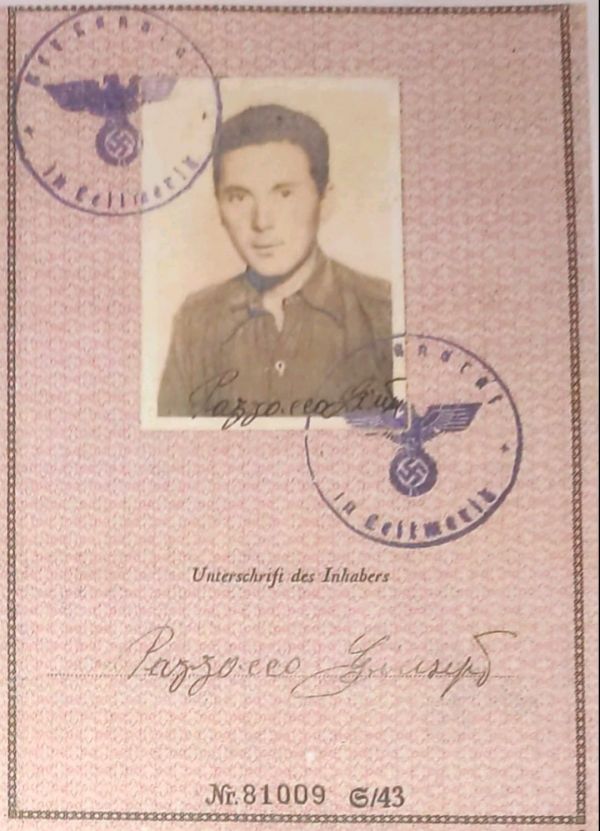One of these boys was called Giuseppe Pazzocco, born in 1922 in the village of Roveré Veronese. He arrived in Santa Maura - Corfu in 1942 and then reached Kefalonia in February 1943. The family does not have much information on the period spent in the Ionian Islands: the ticket for getting there, some words of greeting learned in Greece, some faded family memories. Like the other veterans, Giuseppe did not like to talk about the war. He left a few lines on a sheet of paper, a list of dates and events, rare anecdotes. It is not easy to find the words to describe the panic and chaos of those days in Kefalonia, the capture and the horror of deportation to Germany. Joseph made bread in the camp, he probably knew the locals. He did not die with his fellow soldiers because, according to some accounts, he was ill on the day of the shooting and was in another place. Documents in the possession of the family say that between 9 and 22 September he was part of the "partisan formation" Acqui Division but in mid-October he was captured and taken to Thessaloniki, where there was a sorting centre. It seems that the prisoners were brought to the mainland by ships and that two of these ships were sunk by bombs. While the soldiers tried to save themselves by reaching the shore, the Germans fired at the survivors, turning the sea blood-red. After a long period as a political prisoner in a concentration camp and then in a labour camp, Giuseppe returned home in 1945. A skeletal 23-year-old boy who escaped a massacre, the concentration camp and the bombing of the city of Dresden, returned to Roveré Veronese with makeshift means, feeding himself with sugar lumps found in abandoned houses.
We found the same resilience in the stories of an elegant lady we met on a very hot summer day at the post office. Fortunately, the line was long and we had a lot of time to talk to Mrs. Stamo. She told us about her life in Athens and that she was spending the summer in Faraklata, her home village. She had studied in Italy many years before and she still loved our language and our people very much. The Italians are part of his family history and we were surprised to feel so much emotion and affection in spite of the reprisals that her family suffered precisely for their solidarity with the Italians. In September 1943, in the tragic days in which Italian soldiers were shot with cowardice by former German allies, Stamo’s aunt rescued Captain Pampaloni, the only survivor of his unit and a figure who a few decades later would have become the protagonist, mystified and stereotyped, of the novel Captain Corelli's Mandolin. The aunt took Pampaloni to her father, the Pope of Faraklata. The soldier was treated and joined the partisans, then moved to mainland Greece to continue fighting the Germans. However, the Germans managed to learn of the Pope's help to the Italian military and hanged his son on the tree in front of their house. Since then, a cross has been hung on that tree. However, the family maintained contact with Pampaloni after the end of the war. Stamo met him personally as a young student in Italy; she was welcomed with all honours at the Officers’ Club in Florence in an evening of honour that she will never forget.
As Guy De Maupassant said, memory is a more perfect world than ours because it restores life to those who are no longer there. Remembering events, faces and voices allows the past to remain in the present, to save its honours and, if possible, to remedy its mistakes. Cross the villages of Kefalonia with an attentive eye, talk to the people of the island, retrace the places of memory. It will be a great way to pay a tribute to the past we have shared and strengthen the bond with this unique island even more!
Sources: http://www.associazioneacqui.it/it/pagine/storie.html)
Leali ragazzi del Mediterraneo, Cefalonia, settembre 1943, Pietro Giovanni Liuzzi, 2° edizione, dicembre 2014
L’ultimo sopravvissuto di Cefalonia, Filippo Boni, Longanesi
La battaglia di Cefalonia, diario di un reduce, Ermanno Bronzini, Il Mulino, 2019
Cefalonia, il processo, la storia, i documenti, Marco De Paolis e Isabella Insolvibile, Viella, 2017
Cefalonia: anamnesi di una tragedia. Emilio Giaccio, tesi di laurea, Università degli Studi di Roma “La Sapienza” A.A. 2003-2004
Testimonies and documents kindly granted by Giuseppe Pazzocco's family

